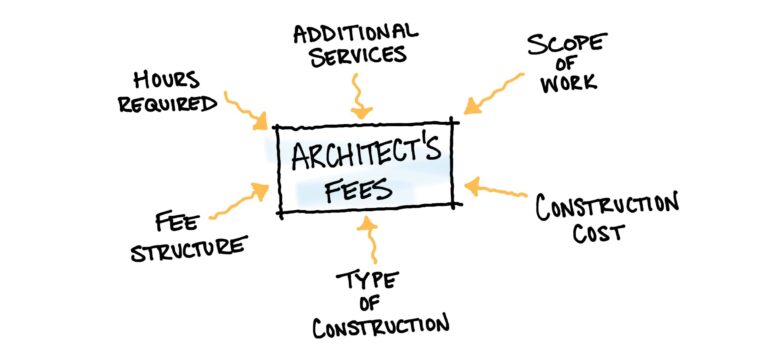Introduction
December’s blog post, “Owner-Architect Agreement,” gave an overview of the major components that are typically seen in a contract between Architect and Owner. One of these major components is the Architect’s fee: the compensation required for the Architect to complete the scope of work discussed. There are multiple factors that play a role in the way an Architect determines their fee, but historical data and industry standards set a range of reliable expectations for clients who are considering an architectural project.

Fee Determinants
Fee Structure
One factor that plays a role in determining the Architect’s total fee is the fee structure: will compensation be calculated as a fixed fee; hourly rate; hourly, not to exceed; or even a cost per square foot method? The scope of work may inform the type of fee structure utilized, but one of the major determinants of fee structure is the type of project. Fixed fees are often seen in commercial projects, but they may be offered for residential projects as well. Much like any architectural project, the fixed fee will often be determined based on the projected construction cost and the level of complexity of the project. The industry standard for a commercial project fixed fee has a large range, but 6-8% of the construction cost is relatively typical for Basic Services. It is important to note that Basic Services consist of Pre-Design, Schematic Design, Design Development, and Construction Documents. Fixed fees are not commonly offered for residential renovation projects due to the complex nature of the project. When a fixed fee is requested or offered for a residential renovation project, architects will generally mark up their fees to account for unknowns. This could be for a variety of reasons including unfamiliarity of the client and their decision-making process, unknowns of concealed conditions within an existing residence, and updates that may need to be made during construction due to any unforeseen conditions. For this reason, Ven Studio always recommends an hourly fee structure for our residential projects.
Construction Cost
Another factor that is considered when estimating fee is the anticipated construction cost. This is a reliable method of estimating fee because construction cost is strongly correlated to the level of difficulty of – and thus, the time required to complete – the design work. Typically, the more expensive a project is to build, the more time will be required to complete the design. One example that can illustrate this concept is the cost of a renovation project versus a new construction project. Renovations cost more money per square foot to design and construct because working within existing conditions and limitations is significantly more challenging than working from an “empty slate.” Industry standards for an Architect’s fee as a percentage of construction cost, depending on the scope of work, is approximately 12-15% for Basic Services for renovation projects and 8-10% for new construction. If the scope of work is limited to pre-design tasks or a feasibility study, this percentage may be lower. If the scope of work includes pricing, bidding, and/or construction administration, this percentage will be higher.
“The theory of architectural compensation is, has been, and will likely always be, in some respect, based partially on the level of complexity, size and amount of detail associated with the project they are designing.”
Hours Required
The final factor that is typically considered when calculating the Architect’s fee is the amount of time estimated to be required to complete the scope of work. This consideration is particularly important in single-family residential projects, where an hourly fee structure is most common. An established Architect will utilize their personal historical data and experience to estimate the amount of time required to complete each phase of the project. The billable rate of the employees assigned to the project will then be applied to the estimated hours to arrive at a fee. Industry standards for the hourly rate of an Architect range between $100-$250 an hour. The lower rates within this range will typically apply to staff with less experience while the higher rates in this range will apply to the more experienced, licensed Architects on the team.
Other Considerations
It is important for clients to note that the fee provided is reflective of the scope of work outlined specifically in the proposal. Additional Services, which will be the topic of next month’s blog, are not included in the fee unless specifically noted. Furthermore, although every care is taken to arrive at the most accurate estimate possible, almost all contracts will outline the need for contingencies. Because it is impossible to predict with complete accuracy the amount of time that will be required to complete a project, clients must allow a small buffer – typically about 10% of the total fee. This will be explicitly stated in the Owner-Architect Agreement.
The Bottom Line
Architectural services carry a fee. This fee is carefully considered based on a combination of experience and industry standards, and reflects the expertise required to complete the project. Architectural projects are significant undertakings that require a substantial amount of knowledge, skill, training, and time to complete. Code interpretation, collaboration with required consultants and jurisdictions, and experience working with contractors both improve the project outcomes and lessen stress on the client. Keeping this in mind, it becomes easier to see an Architect’s fees as a value rather than a cost.
Resources
Architectural Fees | Commercial Architectural Fees
Architectural Fees | Residential Architectural Fees
Architectural Fees | Architect Hourly Fee Rates
